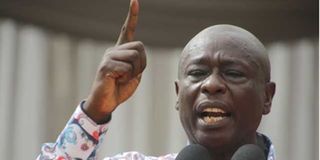Premium
Judges decline to halt Gachagua impeachment hearings

Former Deputy President Rigathi Gachagua addresses congregants during a church service at PCEA Emmanuel Matanya Church in Laikipia County on January 19, 2025.
What you need to know:
- The former Deputy President said the motion to impeach him was founded on deceit, misrepresentations, and suppression of material facts, which had been peddled to the public to achieve an improper and unconstitutional purpose.
- It is also his argument that the one-day public participation process which was initiated by Parliament was not enough to ‘overturn the sovereign will of the people’ who voted for him and President William Ruto in the last general election.
The High Court has dismissed an application by former Deputy President Rigathi Gachagua seeking to suspend the hearing of several petitions challenging his removal.
A bench of three judges rejected the application to delay the hearing of the cases, to allow Mr Gachagua to pursue an appeal on whether Deputy Chief Justice Philomena Mwilu, had the powers to appoint the judges to determine the petitions.
“The application for extension of time to pursue the appeal is a camouflage for a stay of proceedings, which this court declined earlier,” Justices Eric Ogola, Anthony Mrima, and Freda Mugambi said.
Mr Gachagua through several lawyers including John Njomo, Ndegwa Njiru, and Dudley Ochiel had pleaded with the court to suspend the hearing for several months, to allow him to conclude the hearing at the Court of Appeal.
Mr Ochiel submitted that the appeal raises fundamental questions of the law on the jurisdiction of the judges to hear the cases.
“The petitioners are pleading with you to hold your horses. The law states that you must wait as the Court of Appeal is seized of the matter. We have done what the appellate court directed us to do, to expedite the hearing,” Mr Ochiel submitted.
The lawyer said while public interest demands a speedy resolution of the cases, there was public interest in seeking the determination as to how the bench was constituted.
Mr Njiru supported the application saying by proceeding with the hearing of the petitions, the judges will be rendering the appeal an academic exercise.
“The respondents have not demonstrated what prejudice they will suffer if the cases are adjourned. It is our client who is suffering. He was removed from office while they (those in government) are still enjoying the trappings of power,” he argued.
The application was opposed by Parliament and Attorney General Dorcas Oduor arguing that the petitions were filed under certificate of urgency and public interest demands that the matters be concluded soonest.
The judge said in the ruling that they would stop the proceedings once served with an order from the Court of Appeal, suspending the hearings.
“Accordingly for these reasons stated, the prayer for adjournment is declined,” the judges said.
The court at the same time allowed the parties who sought to amend their petitions, to do so within 14 days.
The bench directed the case to be mentioned on February 27 for directions on the hearing of the consolidated petitions.
The hearing of the case was adjourned in November last year, to allow Mr Gachagua to pursue an appeal challenging the powers of the Deputy Chief Justice, to appoint the bench.
Justices Ogola, Mrima, and Dr Mugambi were on Thursday informed that the appeal was yet to be heard.
Mr Gachagua is challenging the powers of the Deputy Chief Justice to assign judges to handle the petitions.
The former deputy president is also challenging the decision to lift a conservatory order, blocking Prof Kithure Kindiki from assuming office.
Prof Kindiki was sworn in as the third Deputy President on November 1, 2024, a day after the High Court lifted the order, blocking him from assuming office.
The three judges had ruled that the mandate exercised by the Chief Justice under Article 165(4) of the constitution- on appointment of benches to determine weighty constitutional issues, was an administrative function and the DCJ can assign judges when she is discharging any of the constitutional functions on behalf of the Chief Justice.
Mr Gachagua maintained that the appointment of benches was a preserve of the Chief Justice and the DCJ lacked legal capacity to assign the judges.
In the petitions, Mr Gachagua challenged the impeachment, arguing that the allegations against him were founded on falsehoods and outright lies.
The former Deputy President said the motion to impeach him was founded on deceit, misrepresentations, and suppression of material facts, which had been peddled to the public to achieve an improper and unconstitutional purpose.
It is also his argument that the one-day public participation process which was initiated by Parliament was not enough to ‘overturn the sovereign will of the people’ who voted for him and President William Ruto in the last general election.





